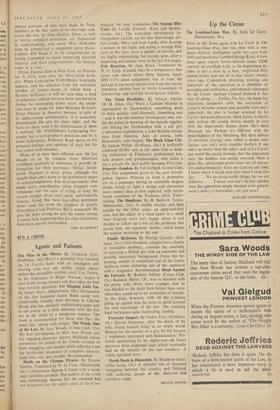Up the Circus
The Looking-Glass War. By John Le Carrel. (Heinemann, I8s.) BACK in the Zone again with -Le Carrel in The Looking-Glass War, but this time with a run- down military intelligence outfit left over from 1945 and based near Lambeth Bridge Road. A free- lance agent reports Soviet missiles under DDR control; an overflight fails, so the department de- cides to put a man in, a bent, Anglicised Pole named Leiser and one of its best chaps—twenty years ago. Conception, planning, training and execution of the operation is a shambles of nostalgia and inefficiency, and urbanely sabotaged by the Circus—perhaps Control planned it that way all along. . . . Unlike The Spy, the book has disastrous longueurs with the evocation of Leiser's refresher course and, possibly even more important, the plot is further wrecked by Le Carrel's betrayal-obsession; when Leiser is inevit- ably written off, young Avery, deeply in love with the department, breaks down. He's been betrayed, too. Perhaps it's different with the peace-fighters of the Abteilung. But these defects of narrative strategy only reflect a deeper con- fusion; you can't write credible thrillers if one side's no better than the other, and in Le Carrel's last novel the classic formula that the opposition were the baddies was neatly reversed. Here a grey, flat, sub-Greene prose irons out all charac- ters indiscriminately. Give me Control any time, I knew where I stood with him when 1 read The Spy: `. . . We do disagreeable things, but we are defensive . . . I mean you can't be less ruthless than the opposition simply because your govern- ment's policy is benevolent, can you now?'
HOWARD ENZENBERGER






































 Previous page
Previous page